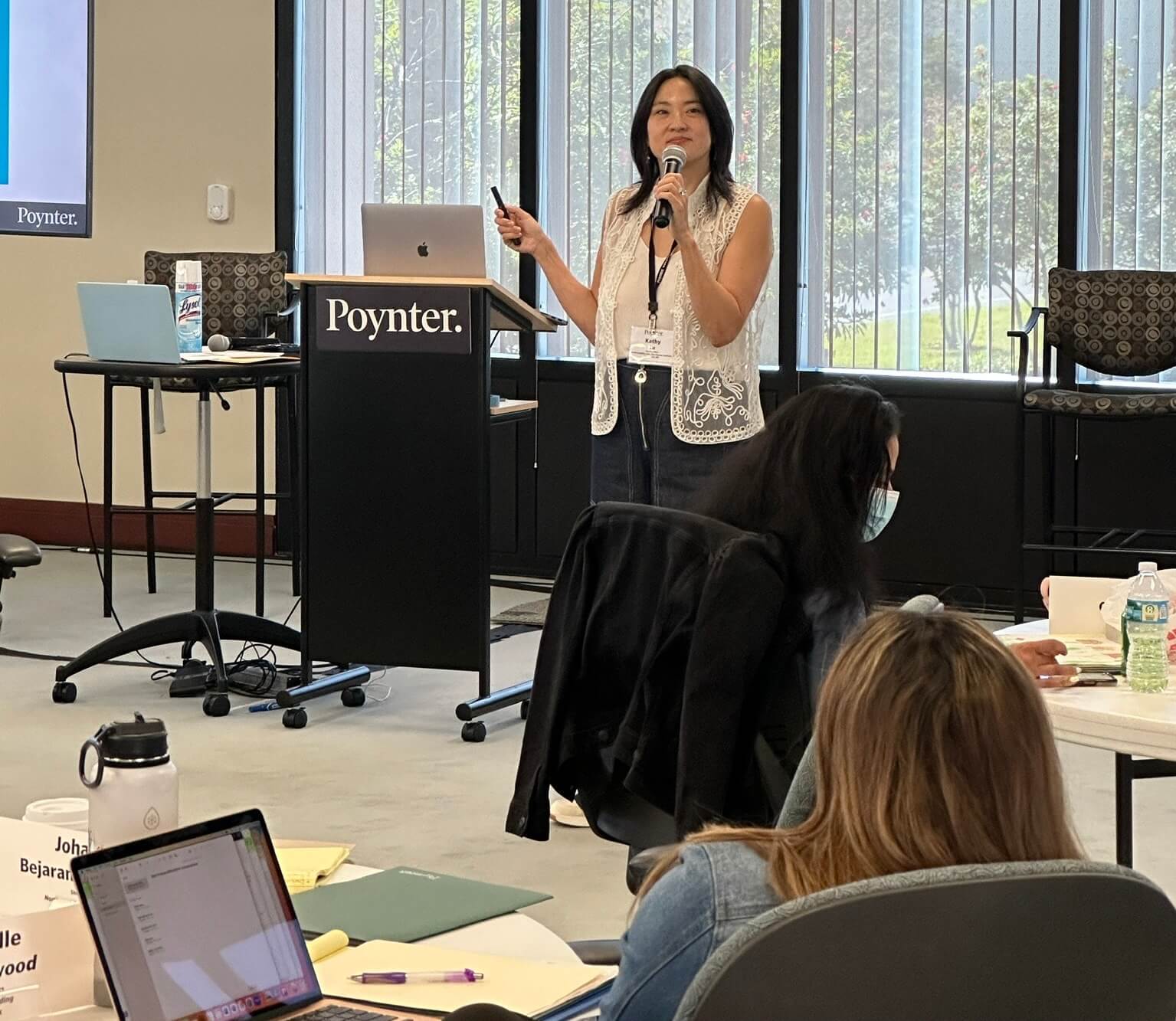At last week’s Online News Association conference, futurist Amy Webb listed several journalism jobs of the near-future, including a data and algorithms investigator, an augmented reality producer, a lead data scientist and a platforms manager.
cc: every journalism school, it's time to update your syllabuses #ona16 #ona16trends pic.twitter.com/wHoLxQbUHX
— alex duner (@asduner) September 17, 2016
The list raised several eyebrows on Twitter, particularly for the jobs that Webb considers “out” — which include roles like “reporter” and “fact-checker.”
OUT: facts
IN: buzzwords https://t.co/L75Kpq84LZ— AJ (@ajchavar) September 17, 2016
.@amywebb You know I have mad respect for you, but no. We teach skills that grow, not for trends that fade. @asduner #ona16trends #ONA16
— Robert ? L.A. (@webjournalist) September 18, 2016
@asduner I actually think that there are several good ideas on that slide. No sarcasm
— Alberto Cairo (@albertocairo) September 17, 2016
I’m not sure if journalism is still journalism without reporters or fact-checkers, and I don’t think algorithms or automations will replace boots-on-the-ground reporting.
But I do see a lot of merit in thinking about the types of skills that journalists may need to learn to enhance their reporting, determine how to find the largest possible audience for that reporting and measure whether or not a piece successfully reached its intended audience.
I recently surveyed a bunch of journalists to see what skills we wish we had learned in college. Kelsey Proud, the managing editor of digital at WAMU, encapsulated what many others said: “I think I had a pretty well-rounded collegiate experience at the University of Missouri. However, like many journalists, I’d imagine, I do wish I’d taken more in computer science and business management. I’ve garnered knowledge around those topics as I’ve grown as a professional but I would have benefited from more discussion of the finer points in school.”
In my survey, most people, like Proud, wished they had taken more classes in statistics or computer science or business. (If you’re currently in school and want to work in journalism, I recommend taking one of each of these.)
If you’re out of school, however, there’s still hope if you want to be the world’s next data and algorithms investigator or the platforms manager for your newsroom. And there’s not necessarily a need to go back to school — many of these roles have lots of resources online that you can access for free. Below is a list that I rounded up for a few near-future jobs — please add more in the comments.
Data and algorithms investigations team: This sounds complicated, but it’s really not. Data structures and algorithms are basically procedures for performing efficient, reliable tasks. You can use algorithms to do things like calculate really large numbers or compress audio or produce thousands of automated news stories on a particular topic.
If you’re interested, Dartmouth has a good intro to algorithms class online. If you prefer textbooks, I recommend this free one by Kurt Mehlhorn and Peter Sanders, and this syllabus from the University of Western Australia.
More reading: CJR’s Investigating the algorithms that govern our lives; Tow Center’s Guide to Automated Journalism.
Enhanced Reporter: No, it’s not someone with a robot arm or a reporter who shoots lasers from her eyeballs; Webb was referring to reporters using artificial intelligence to help them discover trends or different angles of a story.
It may sound farfetched, but it’s the same technology that’s used in facial recognition software, automatic scheduling software and speech recognition — why shouldn’t reporters apply it to their own work? To learn more about the mathematical underpinnings, you’ll need a background in programming, discrete math and statistics — after acquiring those skills, I recommend reading through this Stanford syllabus, and then supplementing with video lectures from MIT.
More reading: 4 Examples of AI’s Rise in Journalism (And What it Means for Journalists); My battle to prove I write better than an AI robot called ‘Emma’
Augmented reality producer: First there were newspapers in Second Life, then there were Washington Post trivia games in Kik, and now journalists may be asked to create experiences in real life that are augmented by sound, video, and other computer-mediated experiences layered on top of the real-world views.
I’ve previously covered how newsrooms can think about augmented reality games; if you’re interested in telling stories in different ways in your newsroom, I recommend starting with this CJR piece which details lots of examples, and then reading this Knight Foundation series on virtual and augmented reality storytelling. Often this role will collaborate heavily with a production story; you can read how “Frontline” recently create a VR documentary in collaboration with Secret Location and the Tow Center for Digital Journalism.
Bot developer: There are many tutorials for building bots, and you can build bots for every type of platform imaginable. One of my favorite bots is the Reddit Bit of News bot, which automatically summarizes certain articles on Reddit. You can even build bots without knowing how to code. I recommend this excellent tutorial by Darius Kazemi if you’re interested in making your own.
How are they useful? Think of something you’d like to automate, or monitor, or do — and there’s likely a bot you can design to help you.
More reading: The New York Times has a 2016 Election bot; Automation in the Newsroom.
Platforms manager, data scientist: As a platform manager, You’ll need a background in A/B and multivariable testing and experiments, and a working knowledge of platforms — because much of your job will be testing strategies on different platforms, monitoring the results, and then iterating for future tests. For both platforms and data science, I recommend this Stanford stats class, along with some classes in data analysis and SQL — because you’ll likely be juggling lots of data and then crunching the numbers to make decisions for your newsroom. Reddit’s Data Science community is quite helpful, as is learning how to use Jupyter notebooks for data visualizations.






